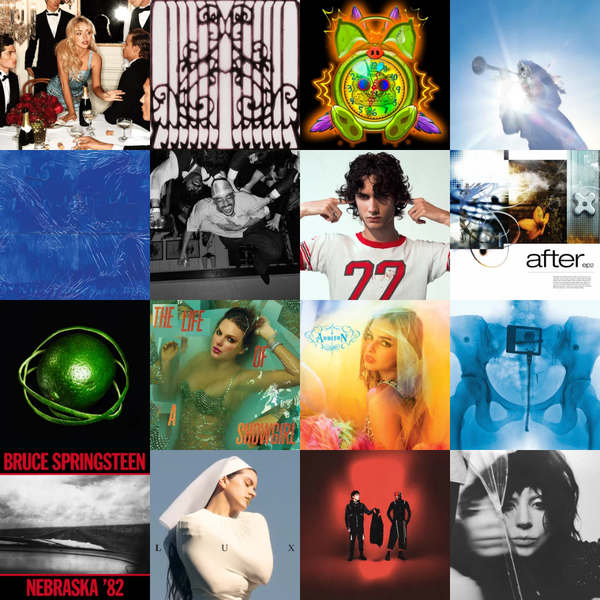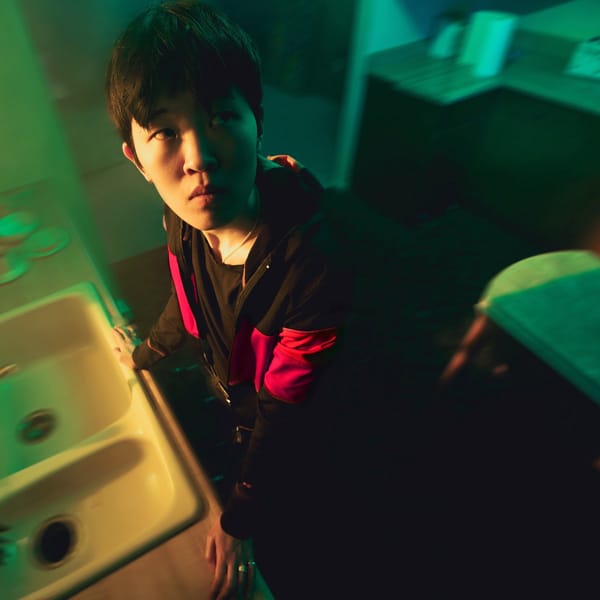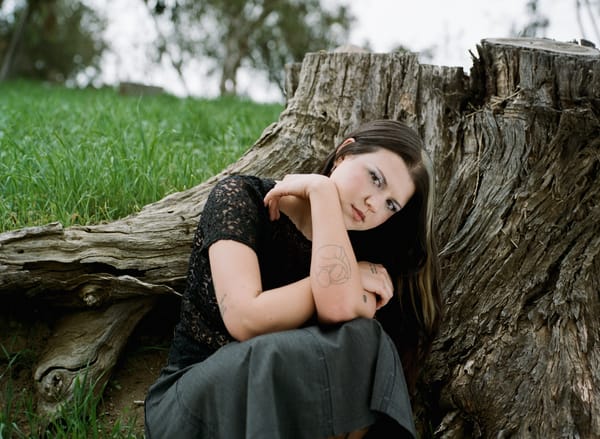Hannah Rambles About TRAP

I can’t stop thinking about this movie so here’s a bunch of words about it. Will try to get Silent Majority Pop out this week or early next week – I have a lot of very exciting things in the pipeline so it might be delayed! Plenty of spoilers ahead, but the movie gets so ridiculous I’m not entirely sure you can spoil it.
Trap is a M. Night Shyamalan movie where the third-act twist is the whole plot. It’s something of an anti-mystery; everything is laid out for you in the opening minutes. If there’s any surprise to be had, it's the emotional core of the movie, focusing on the nuclear family unit and the evil that can arise when a family is hell-bent on keeping the image up.
In the first few minutes, Josh Hartnett’s Cooper is the kind of hot, slightly awkward dad that would have sent Tumblr girls spiraling back in the day (he even looks a smidge like Jared Padalecki!). He’s a little quirky, but sweet and endearing when trying to use his daughter’s slang. It feels adorable that he just wants to give her the best night of her life, with front row seats to her favorite artist and everything. Then he goes into the bathroom, looks at his victim on his phone, and we immediately know we’re following the villain.
Those quirks soon feel sinister instead of wholesome — there’s increasing tension in the gulf between how he appears and what he’s capable of. Maybe Cooper does these grand gestures for his kid out of guilt; maybe it’s just extreme compartmentalization. Either way, he says again and again “never let the two lives touch.” That would be less of an issue if the FBI hadn’t used the Lady Raven concert as a trap (ey!) to get him and expose his double life once and for all.
But the problem is, it’s all one life. There is no dark side, no falsehoods, there’s just a murderer that loves his family, a loving dad whose hobby is horrifically butchering victims. All these things can be true at once, and that’s reflected in Josh Hartnett’s performance. He’s twitchy, sincere, compassionate, and manipulative simultaneously, morphing rapid-fire like the suit in A Scanner Darkly. It’s a miracle that this movie works, and his performance holds everything together. He’s just cartoonish enough to make the increasingly ridiculous ways he escapes believable.
I have limited experience with Shyamalan’s work (movies I’ve seen: Knock at the Cabin, The Sixth Sense, unfortunately The Last Airbender), but I know the general tropes — the visual verisimilitude combined with tin-earned dialogue, the intricate plotting that eventually goes off the rails, and the earnest exploration of familial relationships. This movie is no exception, and even stars Shyamalan’s daughter Saleka as Lady Raven. You can see the seams, particularly the obvious expository ADR, but for a film this personal it becomes endearing.
It’s easy to read Cooper as a stand in — workaholic Shyamalan (didn’t he just do Knock at the Cabin?) making a movie about the joys and griefs of being a Girl Dad and disguises it as horror — but just as Shyamalan was not The Next Spielberg, this is not quite Fabelmans. The more interesting personal aspects are less obvious: so many of the jokes about Shyamalan throughout his career involve his last name, and by extension, his race. It’s no wonder that he created a film where his daughter is not only the biggest star in the world, she accomplishes this without sacrificing her identity. I forgive the movie for indulging just a little too much in Saleka because 1. greatest Girl Dad ever and 2. I'm not the only person to make this observation, but there’s definitely something lovely about so many American people embracing a South Asian pop star on this scale.
I do think Saleka is solid as an actress, or at least more capable than the detractors say — not a revelation, but she does what she needs to do in the movie and gets a proper showcase in the last third. The stiltedness of the film works in her favor. When she gets invested in finding the identity of the butcher, it makes sense; of course a worldwide pop star is arrogant enough to engage in a little battle of wits against Cooper. Raven telling her backstory before a song is not too different from the kind of thing Taylor Swift would share on stage or any other artist making relatable, therapeutic pop. Even Raven’s later visit with the family (given the lie Cooper makes up about Riley’s nonexistent leukemia) isn’t far from Taylor’s interactions with her fans in Secret Sessions and the like. At least, before Taylor became too big to interact with anyone not named Jack Antonoff or Aaron Dessner.
Some things are far past unbelievable, especially the extended intermission between songs hastily explained away with some ADR. But he gets a lot right — the kids in the audience with their phones particularly. As anyone who’s seen that one creepy clip of Drake will explain (I’m not linking that shit), it’s rare to see artists bring people up on stage, yet considering the rest of the movie, he’s fully aware of this. There’s undeniably some satire on parasociality in all this; why would you let a stranger into your home even or especially if they’re a big pop star?? The heightened tone helps me forgive the weirdness. In one scene where Raven mobilizes her fans using Instagram Live. As someone who’s nearly been doxxed twice by stans, I know how quickly they can come together. The only far-fetched (but not impossible) thing about it is that stans can come together for something good!
If you accept that this movie has its own bizarre logic, everything makes just enough sense internally. Shyamalan’s dialogue is actually natural; his characters are just eccentric. DP Sayombhu Mukdeeprom (Challengers) builds upon that strangeness with split diopter shots, overhead pans, and darkly lit extreme closeups. Even Noëmi Preiswerk’s editing feels deliberately haphazard. This movie won’t work for everyone, and I’m not entirely sure why it worked for me except that it's exactly what Shyamalan wanted to make for his daughter. The CinemaSins and CinemaWins videos will be the same length and make the same points, it’s just a matter of whether you’re on the movie’s baffling wavelength. The chaos is so infectious it’s hard not to give everyone the benefit of the doubt.
With all this in mind, I wonder why everyone is so enamored with double lives and compartmentalization lately; Oppenheimer, May December, even Zone of Interest. It’s not that surprising considering we’re in the era that everyone conveniently forgot about Covid. (For what it’s worth, I saw it with a covid-conscious friend, and we wore masks at a Drafthouse screening.) The Butcher’s wife seemingly turned a blind eye despite her suspicions, and it’s not that different from any other family trying to suppress their anger and trauma. An interview described M Night Shyamalan's plots as everyday tragedies, and while that doesn't really makes sense considering how ludicrous his plots tend to become, it doesn't feel impossible.
The movie isn’t particularly interested in examining the Butcher’s motives, because as professional contrarian Richard Brody points out, the half-baked Freudian excuse toward the end is a red herring — that’s why Lady Raven’s desperate attempt to manipulate Cooper by speaking as his mother doesn’t work. (You see why I keep thinking about this movie? How do you even describe it?) The depth comes from Cooper’s relationship with his family as he struggles not to give in to his bloodlust, not the mysterious motives of The Butcher.
The more I watch his movies, I see why queer people in particular have taken to him, and not just because Trap is pretty damn campy and Josh Hartnett will win over Achellians everywhere. There’s a kinship because of how both are culturally treated: internet edgelords would make fun of Shyamalan constantly (particularly after his Last Airbender adaptation deeply failed to capture the magic of the TV show) under the guise of ‘it’s just a joke’, no matter how racist the last-name jokes became. He was misunderstood and his career and life suffered, but he was ultimately respected by film fans who genuinely valued the original stories and eccentricities he brought into mainstream filmmaking. Over the last decade, he’s become respected for his idiosyncrasies and not even in spite of them. Not that M Night is some unofficial gay icon, but the parallels are evident.
I’ve used the word “but” and various synonyms so many times in this current draft, and that’s because basically every single decision deserves criticism and defending. He’s not the next Spielberg, and maybe that’s never what he wanted. For better and for worse, he’s the first Shyamalan. As an easter-egg billboard for his other daughter’s movie The Watchers will tell you, he's not the last.


